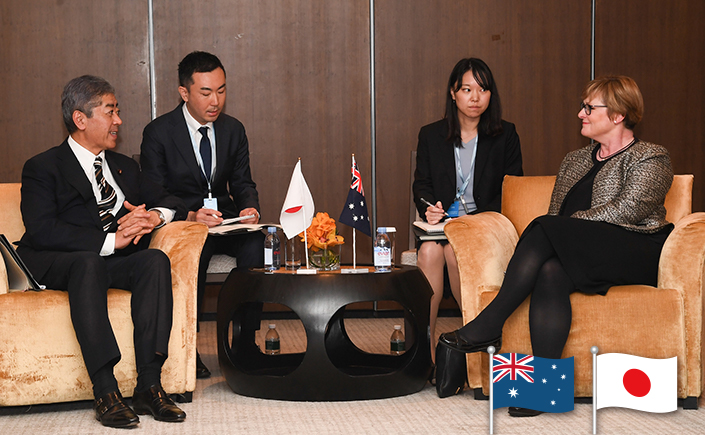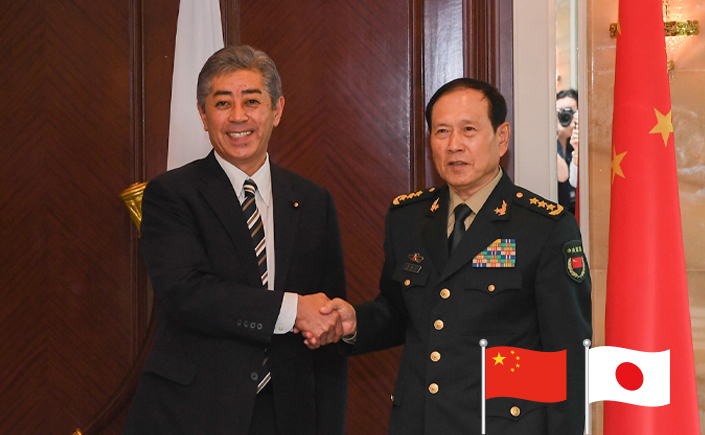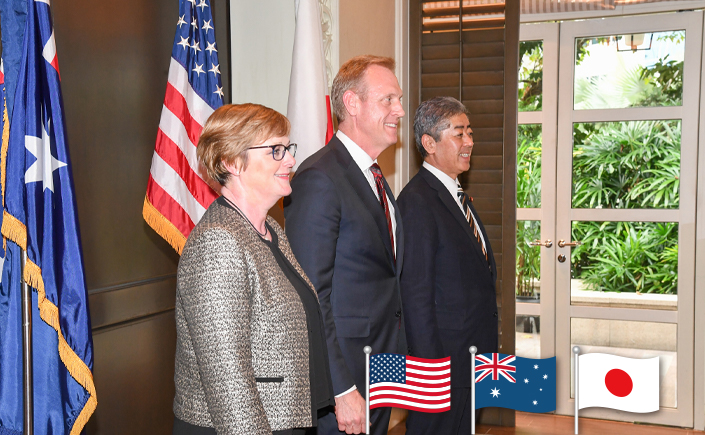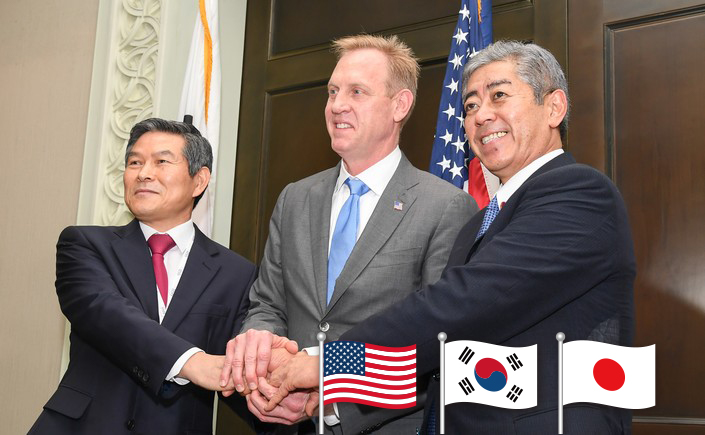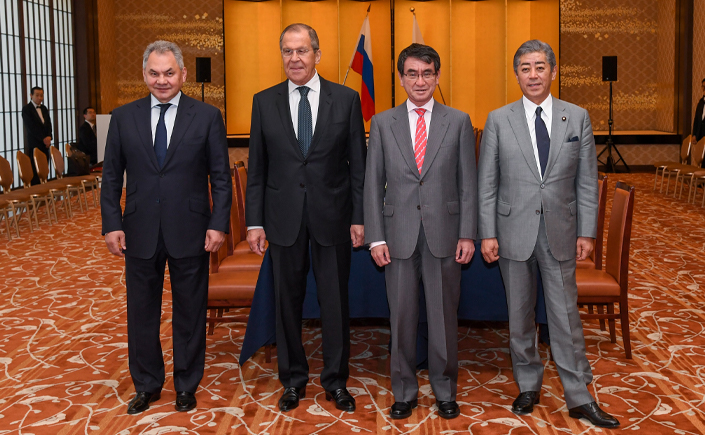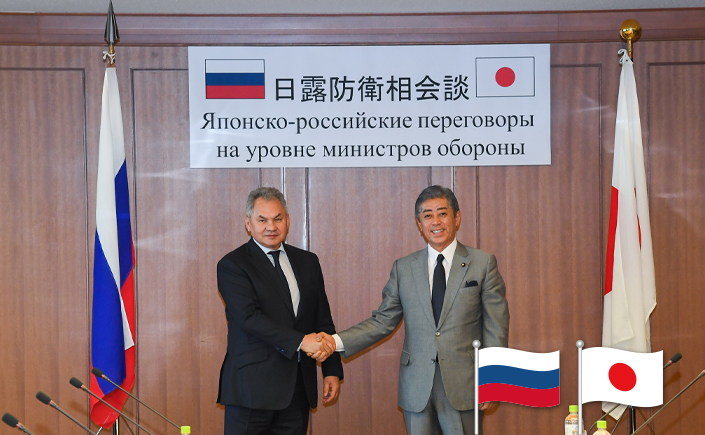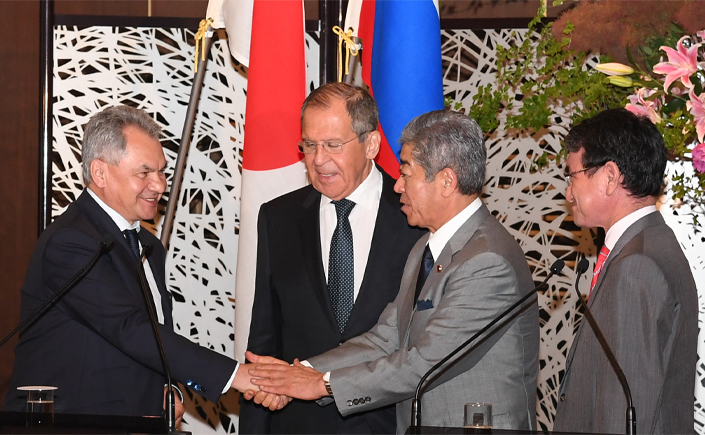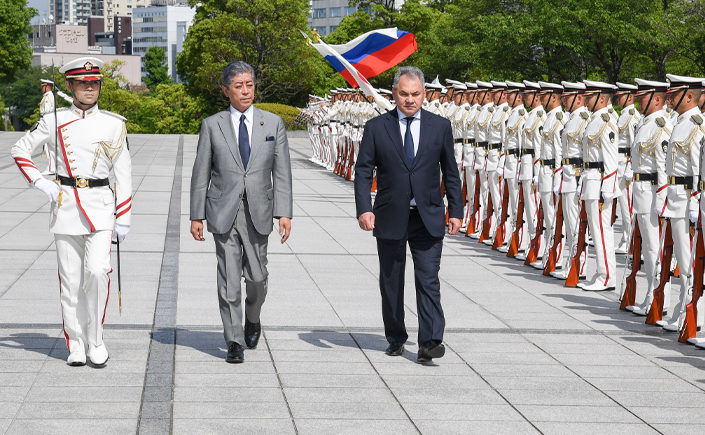SPECIAL FEATURE
The 18th IISS Asia Security Summit – Shangri-La Dialogue –
From May 31st to June 2nd, Minister of Defense Iwaya attended the 18th IISS Asia Security Summit (2019 Shangri-La Dialogue), where he delivered a speech and held meetings with defense ministers represented at the summit.
Summary of Speech by Minister Iwaya
Minister Iwaya gave a speech in the second plenary session, “Korean Security: the Next Steps.” In his speech, he emphasized the importance to seek the complete, verifiable, and irreversible dismantlement (CVID) of all North Korea’s weapons of mass destruction and ballistic missile of all ranges. Having said that, he pointed out that maintaining robust deterrence and sustaining the effectiveness of United Nations Security Council resolutions (UNSCRs) on North Korea are two important roles of defense authorities.
Japan-Australia Defense Ministerial Meeting
To open the meeting, Minister Iwaya congratulated Australian Minister for Defence Reynolds on her appointment and expressed his will for stronger and closer bilateral cooperation between Japan and Australia. In response, Minister Reynolds stated that she would like to deepen bilateral defense cooperation based on extensive past defense cooperation by closely coordinating efforts with Minister Iwaya.
The Ministers exchanged opinions on various issues in the Indo-Pacific region including those related to North Korea and Oceania. Concerning North Korea, both Ministers recognized the importance of international cooperation in upholding UNSCRs to ensure effective sanctions on North Korea. They expressed their intent to continue cooperating closely in surveillance activities to counter illegal ship-to-ship transfers by North Korea.
The two ministers welcomed the progress of bilateral defense cooperation and confirmed the various recent initiatives in that effort, including joint training and exercises, the exchange of defense equipment and technology, and support in capacity building. Based on this exchange, both Ministers confirmed that their defense ministries would continue efforts to further deepen and expand bilateral defense cooperation to strengthen and maintain a free, open, stable, and prosperous Indo-Pacific.
Japan-China Defense Ministerial Meeting
Minister Iwaya and Chinese Defense Minister Wei welcomed the fact that their communication is becoming closer with the fruition of this ministerial meeting, following the one held last October. Both Ministers shared their views to continue the dialogues, including their mutual visits. Both Ministers welcomed the fact that various dialogues and exchanges are being implemented between the two defense authorities, and they shared their views to continue promoting mutual understanding and confidence.
Both Ministers shared the recognition of the importance to realize the mutual visits between the Japanese Defense Minister and the Chinese Minister of Defense as soon as possible, as agreed in the Japan-China summit meeting.To this end, both Ministers confirmed to realize Minister Iwaya’s visit to China at an earliest possible timing this year. Moreover, the two Ministers shared the view to promote high-level mutual visits, including the ones between the Japanese Chief of Staff, Joint Staff Office and the Chinese Chief of the Joint Staff Department.
Both Ministers welcomed the realization of: (1) Japanese Maritime Chief of Staff’s visit to China this April for the first time in approximately five years; and (2) the Japan Maritime Self-Defense Force (JMSDF) vessel’s port call to China in the same month for the first time in approximately seven and a half years. The Ministers confirmed to advance coordination to realize a port call by a Chinese vessel to Japan. Both Ministers shared views to send a delegation from Japan, consisting of JSDF commanders and staff officers, to the Eastern Theater Command within this year following the Eastern Theater Command delegation’s visit to Japan made last November. With respect to the Maritime and Aerial Communication Mechanism between the Defense Authorities of Japan and China, both Ministers welcomed that the mechanism has been effectively in operation since its initiation, and they also confirmed that technical coordination is steadily progressing for an early establishment of the hotline.
In addition, both Ministers shared their recognition on the importance of a stable East China Sea.
Japan-United States (U.S.)-Australia Defense Ministers Meeting
Minister Iwaya, then U.S. Acting Secretary of Defense Shanahan and Australian Minister for Defence Reynolds were united in their shared commitment to do more together in support of security, stability, and prosperity in the Indo-Pacific region.
The ministers affirmed their shared vision for the Indo-Pacific region that is open, inclusive, rules based and respectful of sovereignty, where disputes are resolved peacefully and free of coercion. The ministers recognized the importance of supporting Association of South East Asian Nations-led regional architecture and their support for ASEAN centrality which has played an instrumental role in establishing norms of behavior and habits of cooperation in the region. The Australian and Japanese ministers welcomed the U.S.Indo-Pacific Strategy Report (IPSR) announced by then Acting Secretary Shanahan. The ministers agreed to continue to closely coordinate support to the region to maximize the benefits of their national and combined engagement activities in the region in a transparent, efficient and effective manner under their shared strategic vision.
The ministers underscored the importance of the international community’s ongoing commitment to achieving North Korea’s abandonment of all of its weapons of mass destruction, ballistic missiles, and related programs and facilities in a complete, verifiable, and irreversible manner in accordance with relevant UNSCRs. They confirmed that while a diplomatic path to peace on the Korean Peninsula exists, North Korea remains an extraordinary threat, exemplified by its recent missile launches, that requires continued vigilance.They agreed to continue to fully enforce all relevant UNSCRs. The ministers welcomed and reaffirmed their commitment to sustained international cooperation to deter, disrupt, and ultimately eliminate illicit activities, such as illegal ship-to-ship transfers.
The ministers expressed strong opposition to the use of any coercive unilateral actions that seek to alter the status quo or increase tensions in the East China Sea. They also expressed their intention to remain in close contact on the security situation in that area with a view to deter such actions.
The ministers discussed the importance of adherence to international law and their shared commitment to upholding freedom of navigation and overflight in the South China Sea.The ministers remained seriously concerned about any action including militarization of disputed features in the South China Sea that are destabilizing or dangerous. They emphasized the importance of the peaceful resolution of conflict in accordance with the United Nations Convention on the Law of the Sea (UNCLOS), and expressed strong opposition to the use of force or coercion to alter the status quo; calling instead for all countries in the region to take meaningful steps to ease tension and build trust. All sides called for the Code of Conduct for the South China Sea to be consistent with existing international law, as reflected in UNCLOS; to not prejudice the interests of third parties or the rights of all states under international law; to reinforce existing inclusive regional architecture; and to strengthen parties’ commitments to cease actions that would complicate or escalate disputes.
The ministers underscored their commitment to work with their Pacific partners to support a Pacific region that is prosperous, secure and respects sovereignty. The ministers welcomed and acknowledged the significance of each state’s military-to-military activities, particularly when those activities contributed to whole of government engagement with the Pacific.
The ministers agreed on a Strategic Action Agenda (SAA) that articulates their shared long-term vision for trilateral cooperation in the Indo-Pacific region. They affirmed the SAA would enable their respective defense organizations to plan and implement enhanced trilateral defense cooperative activities.
The ministers underscored the close defense relationship between the three countries, and agreed to do more to coordinate their respective regional defense engagement activities, such as joint exercises and training and capacity building.
Japan-U.S.-Republic of Korea (ROK) Defense Ministerial Meeting
Minister Iwaya, ROK Minister of National Defense Jeong, and then Acting Secretary Shanahan held discussions on North Korea, the regional security situation, and trilateral security cooperation.
With regard to North Korea, they exchanged their views on the recent missile launches by North Korea, and confirmed that they would stay vigilant as defense authorities.
They underscored the importance of the international community’s commitment to fully implement UNSCRs,including sustained international cooperation to deter, disrupt, and ultimately eliminate North Korea’s illicit ship-to-ship transfers. They recognized the international community’s shared goal of North Korea’s full compliance with its international obligations in accordance with all relevant UNSCRs, which call for North Korea’s complete denuclearization in a verifiable and irreversible manner.
The three ministers discussed other regional security issues and concurred on the importance of a rules-based order.
They reaffirmed that freedom of navigation and overflight must be ensured, and that all disputes should be resolved in a peaceful manner in accordance with the principles of international law.
The three ministers emphasized that trilateral and multilateral security cooperation led by the three countries plays an important role in maintaining peace and stability in the region. They committed to further trilateral security cooperation, including information sharing, high-level policy consultation, and combined exercises.
Japan-Russia Foreign and Defense Ministerial Consultation (“2+2” Ministerial Meeting) and Japan-Russia Defense Ministerial Meeting
On May 30th, Mr. Kono, Minister for Foreign Affairs, and Minister Iwaya, held a Japan-Russia Foreign and Defense Ministerial Consultation (“2+2” Ministerial Meeting) with Mr. Lavrov, Minister of Foreign Affairs, and Mr. Shoygu, Minister of Defence.
1. Confidence Building between Japan and Russia in the Field of Security
(1) Communication of Japan’s stance
Minister Kono and Minister Iwaya stated that the military build-up in the Northern Territories by Russianforces, including missile firing exercises and fighter-aircrafts deployment is inconsistent with Japan’s legalpositions. In addition, Minister Iwaya expressed a concern about the vigorous activities of Russian military aircrafts around Japan and called for a calm response from Russia.
The Russian ministers expressed their stance with regard to concerns about Japan’s missile defense system, including Aegis Ashore. In response, Minister Iwaya explained the National Defense Program Guidelines that were formulated in 2018, noting in particular that Japan’s missile defense system, including Aegis Ashore, which the Russian side had been noted, is purely defensive, and as such does not pose any threats to neighboring countries including Russia.
(2) Defense exchanges
The ministers welcomed the recent successful visit to Russia by the Chief of Staff of the Japan Ground Self-Defense Force (JGSDF). It was confirmed that joint Japan-Russia Search and Rescue Exercises (SAREX) willtake place in Vladivostok in mid-June and that towards the end of the year a Russian naval commander will visit Japan.The ministers also confirmed that the JGSDF Central Band will take part in the International Military Tattoo “Spasskaya Tower” in Moscow this coming summer.
(3) Japan-Russia cooperation on responses non-traditional threats
With regard to cooperation on responses non-traditional threats, such as in the field of counter-narcotics, the ministers shared the view that positive cooperation outcomes are being built up between Japan and Russia in this area.
2. Regional Affairs
(1) North Korea
The ministers exchanged opinions about the latest developments relating to North Korea, and Minister Iwaya pointed out that the launch of a short-range ballistic missile by North Korea on May 9th was a clear violationof UNSCRs. The ministers confirmed that Japan and Russia will continue to cooperate on achieving the denuclearization of North Korea which is a common goal for both countries.
(2) Free and Open Indo-Pacific
In the course of discussions on regional affairs, the Japanese ministers conveyed their wishes to continue toengage in dialogue with Russia in order to realize the vision for a “Free and Open Indo-Pacific.”
(3) Other matters
The ministers exchanged the views about a range of urgent international issues including Iran, Syria, Ukraine, Venezuela, and nuclear disarmament and non-proliferation.



